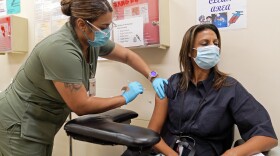The omicron variant of the coronavirus has been detected in the United States. The first U.S. case of COVID-19 from the omicron variant was reported Wednesday in California. Since then, another case has been reported in Minnesota. And more are inevitable.
Local health officials say they're closely monitoring cases in Washington state to see when it shows up here, and that we have the capability to detect it quickly. But a lot is still unknown about this variant.
As scientists work to learn more, KNKX spoke with Dr. Jeff Duchin, health officer and chief of communicable disease epidemiology and immunization at Public Health – Seattle & King County.
He discussed what we do know, and how worried we should be. Listen to the conversation above, and read some highlights below.
INTERVIEW HIGHLIGHTS
On how worried we should be: "What we should be most concerned about right now is the delta variant, which makes up virtually all of the virus that's circulating, not only locally but in the country. The omicron variant is a real concern. ... We don't know when, if, or how much of a problem it may ultimately turn out to be here in the U.S., here in western Washington or King County. Clearly the virus has some features that are important to pay attention to. It seems to be moving quickly in one particular part of South Africa, where it was first reported from, but that doesn't necessarily tell us how it will behave in other places."
On the deluge of information about COVID, variants and more: "It's really important for people to take a step back, take a deep breath, and remember that a lot of what we're hearing about is very stressful. You have a constant barrage of new information and worry and hypothesizing, and what-ifs. We really have some very good tools to help us deal with the situation that actually is occurring. ... Try not to go down that rabbit hole where we're assuming some of the things people are speculating about are going to happen. Take a step back from the 24-hour news cycle. Get your news once a day, or every other day, because this information is not going to evolve rapidly."
On booster availability: "The situation is that a lot of people are becoming eligible for booster shots, and when we get new eligibility ... we've seen a surge of people coming in that's exceeded the initial capacity to schedule appointments. We expect that, over time, that will ease up. ... I wish we had more availability locally, and we're doing everything that we can, but we understand that there are more people seeking vaccination today than can get appointments. We're doing whatever we can to fix that problem."








